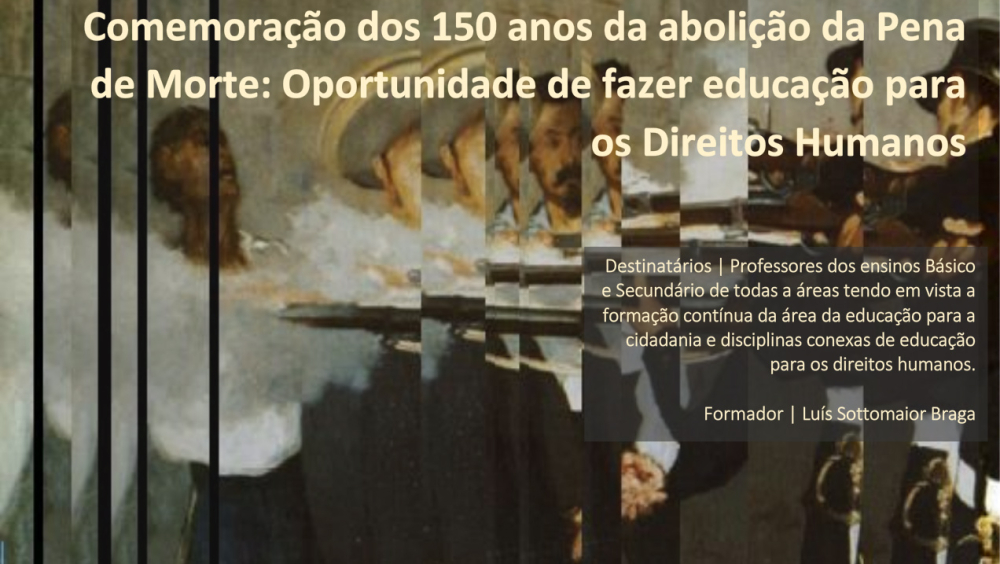European Heritage Label: from Archive to School
The story we would like to tell is about the implementation of a strategie to spread the European Values that are embodied in the “Charter of Law for Abolition of the Death Penalty and Reforming Prisons (Portugal, 1867) to a wide number of young people.
On the occasion of the 150th Anniversary Commemorations of Abolition in 2017 /2018, the National Archive integrated a Teacher`s Training based on the perception of a certain unawareness about the way this topic is being approached, or not, in schools.
During the visits to the exhibition "Abolition of the Death Penalty and European Citizenship" promoted by the Educational Service, since 2015, we realized:
- The topic "Death Penalty" is rarely addressed in schools either in the context of History or in projects related to "Human Rights";
- From the teachers who accompanied their groups in the study visits, we learned that they would like to be better able to develop pedagogical strategies adequate to approach the issue of the Death Penalty.
These teachers, effectively, revealed to us that this issue had, very immediately, the capacity to provoke among the student`s very exciting and controversial debates, these not always easy to deal with;
- There was also a need to counteract a certain current of opinion, widespread among us, supported by the idea that Portugal was one of the pioneers in abolishing the death penalty for civil crimes for more than 150 years, and because the European Union is a free zone of the Capital Penalty, there is no need to talk about it since Human Rights are guaranteed.
Nothing is more fallacious and dangerous: nowadays this is a current debate for the biggest part of the Humanity, so it continues to be the reason why it is important to involve, develop and give young people a greater awareness about the fragility of Human Rights;
- The ideals of the European Heritage Label, as a recent initiative, also required to be made more widely known by teachers, in particular, its significance and fundamental goals in order to be better integrated as part of Citizenship Education in schools;
In the face of this perception, a strategy was designed to promote a Training for Teachers addressed to all levels of public education. It was important to encourage new and creative ways of approaching this issue in schools.
The Training Action was carried out with the following denomination:
"Commemoration of the 150th anniversary of the abolition of the death penalty: an opportunity to educate for Human Rights"
The action was supported by Amnesty International Portugal, the Teacher`s Training Centre of Vale do Minho and the School Library Network.
Also, the history teacher, Luís Sottomayor Braga, who has deep knowledge and experience in this subject oriented it voluntary as an activist for Amnesty International Portugal.
With these partnerships has been possible to carry out a free and certificated Training, action of 15 hours, for 18 teachers during 3 days, with the following general and specific objectives:
• General objective,
To prepare the teachers for teaching the curricular area of Citizenship and Development in accordance with the National Strategy for Education and Citizenship defined by the Ministry of Education of Portugal.
• Specific objectives,
1-To understand the importance of Human Rights as a central cultural element in European and Portuguese society;
2. To associate the debate on the death penalty with contemporary general human rights issues;
3- To structure the argumentation about the debate on the abolition of the death penalty;
4- To provide up-to-date information on the current status of the topic at the international level and provide tools for its approach in the classroom.
5- To know how the "European Heritage Label” celebrates and symbolises European ideals, values, history and integration.
Results
The active participation of the teachers in the debate and critical reflection during the training resulted in the production of extremely inspiring final works.
Teachers produced pedagogic resources covering all education levels.
The work proposals were so diversified, fruitful and inspiring that could be adapted and reused by the teachers who intend to work on this in their schools.
Then we decided, with the authorization of the authors, to publish them on the website "150 years of Abolition" intending to provide new approaches to the mentioned issues.
On October the 10th, celebrating the European and World Day of Abolition of the Death Penalty, we began to publish some of the final works on our website.
